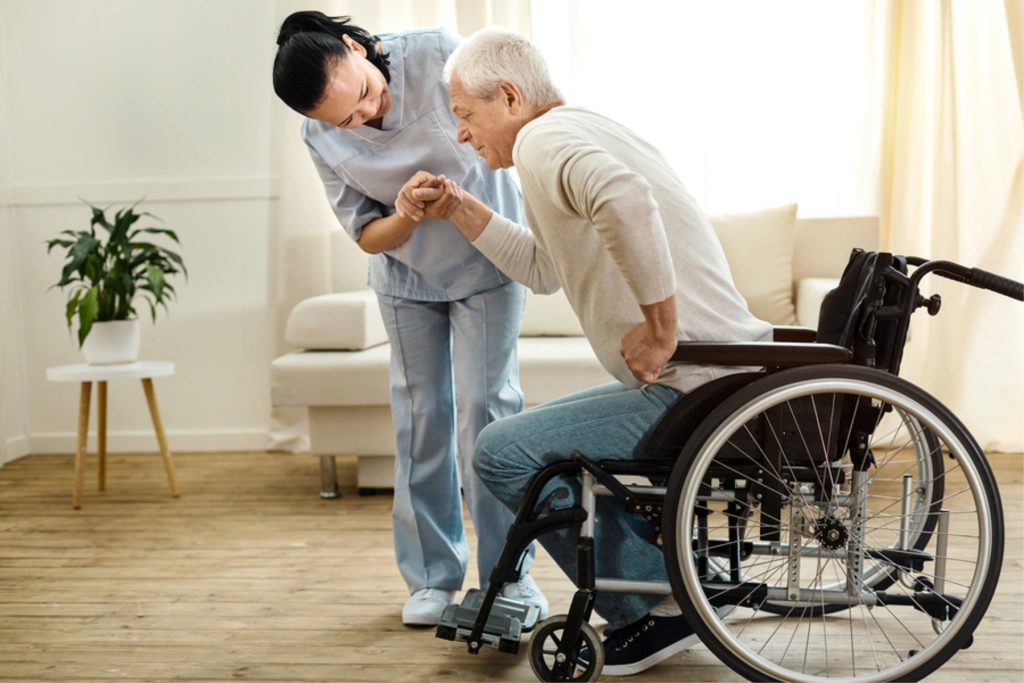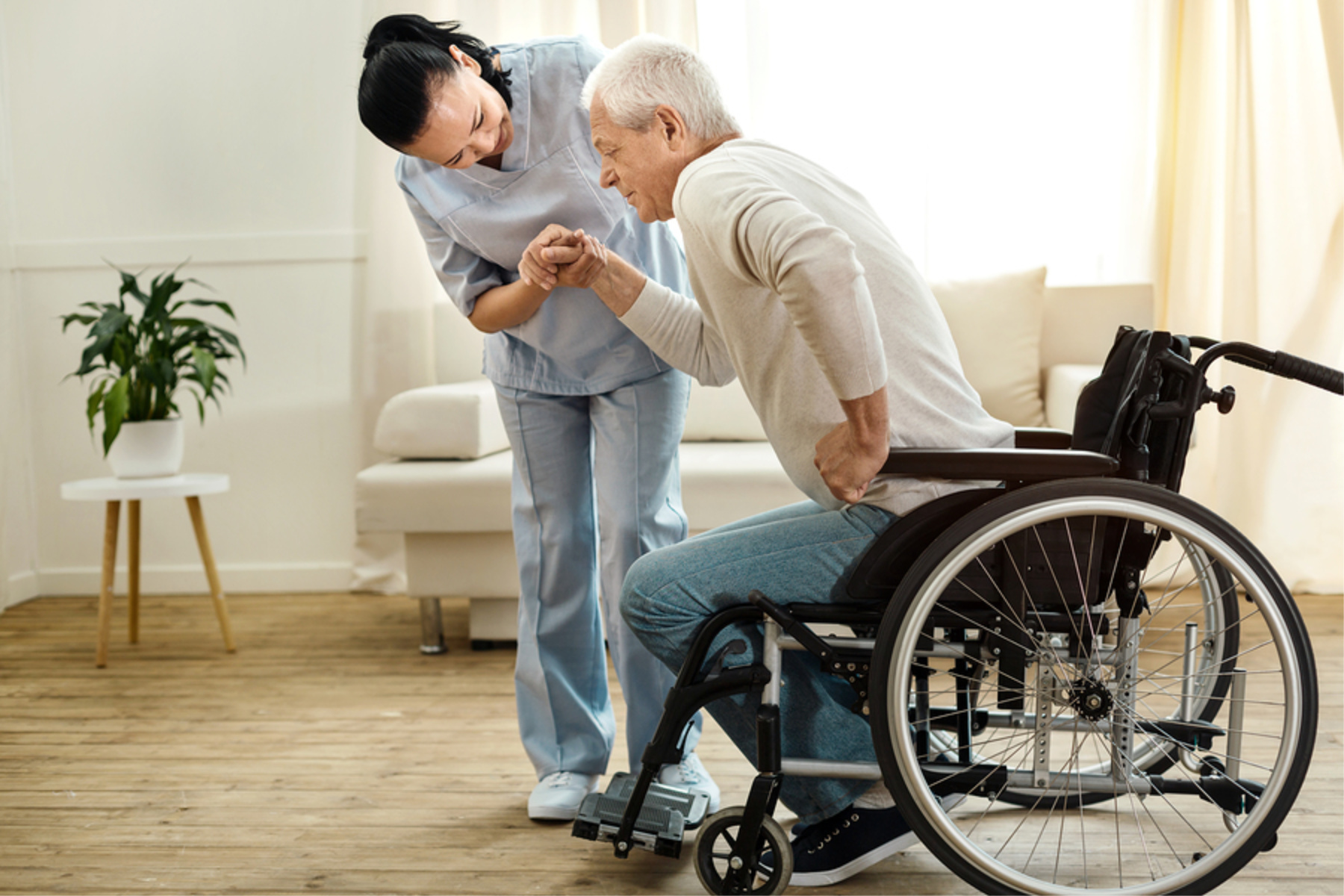
Physical disability. Nice sad aged man holding a caregivers hand and trying to get up while having a physical disability
Accidents in industrial environments and on roads cannot be predicted and can lead to subsequent disabilities for anyone. Disabled World states that road-traffic accidents account for the highest number of accidental deaths and numerous injuries. Head injuries are predominantly caused by road-traffic accidents, falls, assaults, and sports.
It is difficult to cope with physical disability following an accident. In the first few days and weeks, you may be at the hospital, and then you will need to go back home, where everything is different. You will have to adjust before you can think about how life might look in the future.
Here are some tips that might be useful when you try to recover from such a situation:
Table of Contents
Stay Positive
You are not your disability. You are a person who happens to be disabled. Your disability does not define you, and it should never hold you back from doing things that make you happy or bring joy into your life.
You may have heard people say, “it takes more courage to live with pain than die from it.” That means those with disabilities have an even greater opportunity than others.
According to the World Health Organization (WHO), disability is a fundamental aspect of the human experience, resulting from the interplay of health conditions like dementia, blindness, or spinal cord injuries and a variety of personal and environmental factors.
Today, roughly 1.3 billion people, or 16% of the world’s population, experience significant disabilities. And this number is increasing due to the rise in non-communicable diseases and longer lifespans.
Rather than simply accepting the situation as fate and living with the condition, you can choose how you want your life to go by refusing defeatism in favor of being positive, despite all odds stacked against you.
Get Help with Daily Activities
Don’t be afraid to ask for help. It’s okay to tell your friends, family, and loved ones that you need their support during this difficult time. You may think that asking for help makes you weak or less capable than the person who doesn’t need assistance with daily activities, but it doesn’t. It shows that you’re making an effort to recover and get better as quickly as possible.
You should also consider getting professional help with physical disability recovery if necessary. There are many therapists out there who specialize in helping people recover from injuries.
Don’t be ashamed. Ask someone close by if they know of any therapists who can provide services such as massage therapy or physical therapy sessions regularly until full recovery is achieved.
If they don’t know anyone off-hand, then search online using keywords like “massage therapist near me” or “physical therapist near me.” There are plenty of options available, so don’t hesitate.
Make Lifestyle Adjustments
If you’re going to be living with a physical disability, it’s important to make sure that your home is set up in a way that makes life easier for you. Here are some things you should consider:
- Make sure the bathroom is accessible. This includes being able to reach the toilet and washbasin without having to climb over anything or ask someone else for help.
- Make sure there are no obstacles between where food is stored and where people eat (e.g., between the refrigerator and dining table). If possible, store heavy items such as cereal boxes on lower shelves so they’re easier to access when preparing meals or snacks.
Talk to Others about Your Feelings
It’s important to talk about your feelings. Talk to a friend, family member, or therapist. They can help you work through your emotions and understand what you’re going through.
If you don’t have anyone who can provide support, try joining an online support group for people who have been through similar experiences. You’ll learn that others understand what it’s like, which will make it easier for you to cope with the loss of control over your body after an accident.
Don’t be afraid of talking about how much this has affected our life. Not only will this help you cope better, but it will also ensure your loved ones know how much their love means to you.
Be Kind to Yourself
You are not alone, and you can get through this. You may be feeling guilty or ashamed about your situation, but don’t blame yourself. Accepting the fact that you were in an accident and it resulted in physical disability doesn’t mean that it was your fault or something you should feel ashamed about. Accidents happen all the time, and sometimes they have serious consequences like a permanent disability.
Unfortunate accidents like a recent St. Louis, Missouri, car crash, reported in KSDK, had an innocent teen volleyball player lose both her legs. The girl, Janae Edmondson, was in St. Louis for a tournament when a Chevrolet struck an Audi. The Audi crashed into the girl walking in the area.
You can call your accident fate or whatever, but it’s also important not to let your disability define who you are as a person. You’re still the same person with the same personality traits as before. It might take some time for this idea to sink in. But eventually, it will become easier for you (and others)to accept these changes.
Consider Legal Options
If you’ve been injured in an accident, you may be able to recover compensation for medical bills, lost wages, and pain and suffering. The first step is to consult with a local attorney who has experience handling personal injury cases such as these.
If, like Janae Edmondson, you are injured in an accident in St. Louis, a St. Louis personal injury attorney firm like TorHoerman Law, LLC, can help you navigate the legal process and negotiate with insurance companies to ensure you receive the financial support you need.
Firms like TorHoerman Law often don’t charge anything from the client unless they win, which is a relief, considering you already have to pay the cost of medical treatment.
Focus on Your Strengths
When you’re recovering from an accident that results in physical disability, it can be easy to focus on your weaknesses. For example, if you used to be able to run marathons but now find yourself unable to run for more than a few minutes without pain and exhaustion (or even at all), then this may seem like an insurmountable obstacle.
However, there are many other ways of being active and healthy. Maybe you could swim or bike instead? Or maybe other things come naturally for which no amount of training would prepare one, such as being able to cook delicious meals with limited ingredients or having good taste in clothes?
These strengths can help offset the loss of some abilities while making up for others entirely.
Conclusion
In the end, it is important to remember that recovery from an accident that results in physical disabilities can be a long and difficult process. However, staying positive and having a good support system of friends and family members who understand what you’re going through will help make this journey less stressful for everyone involved.











